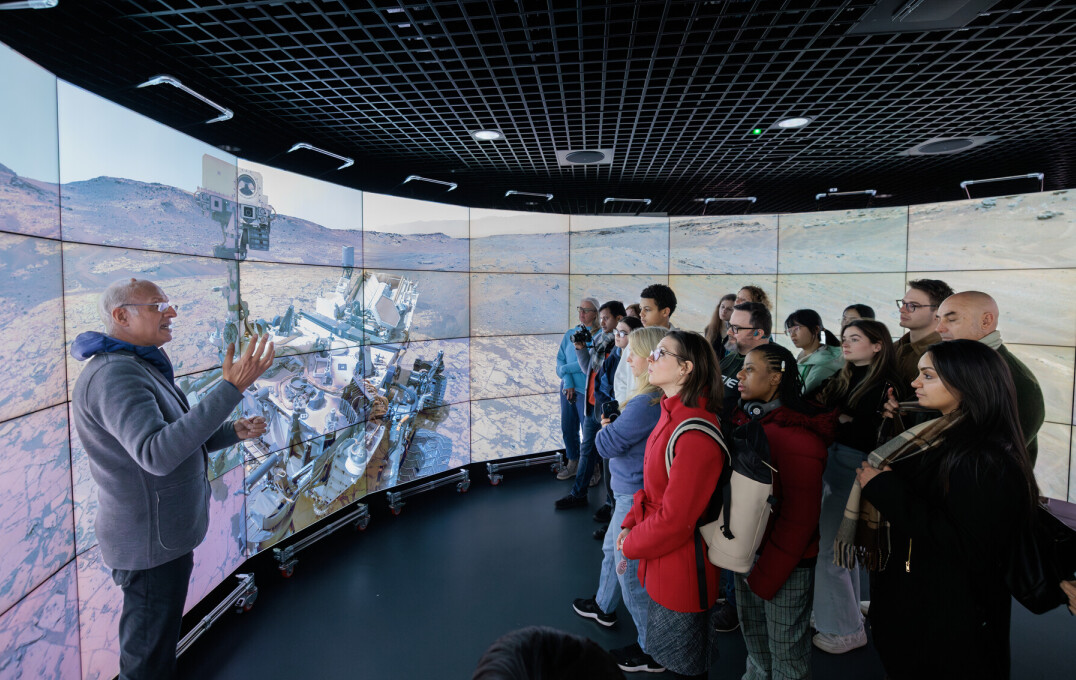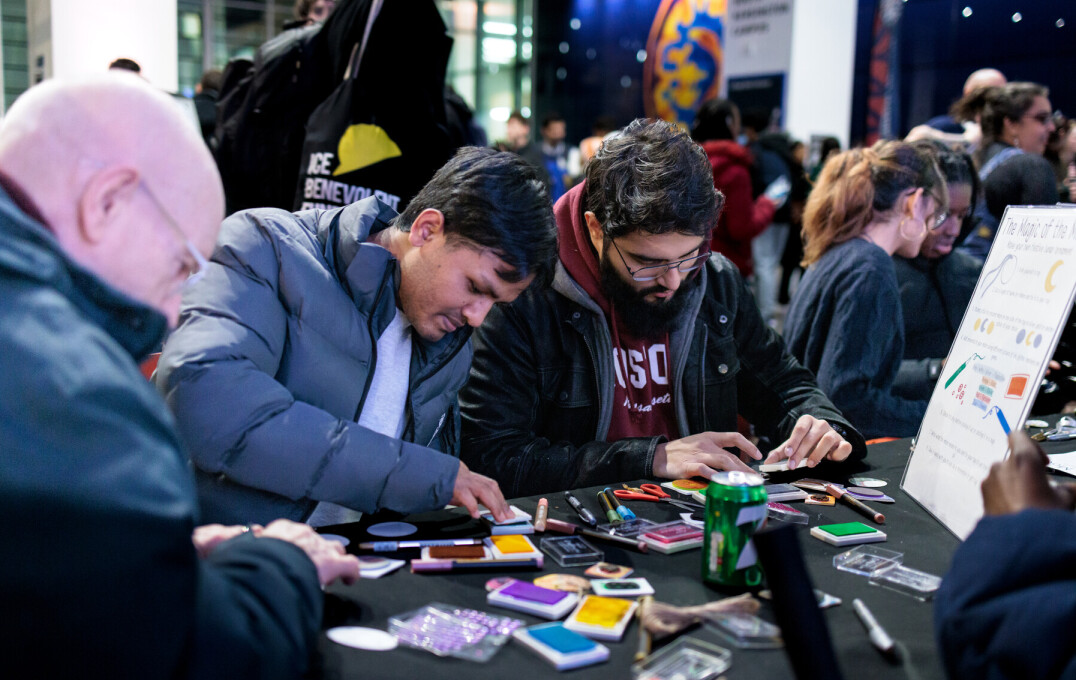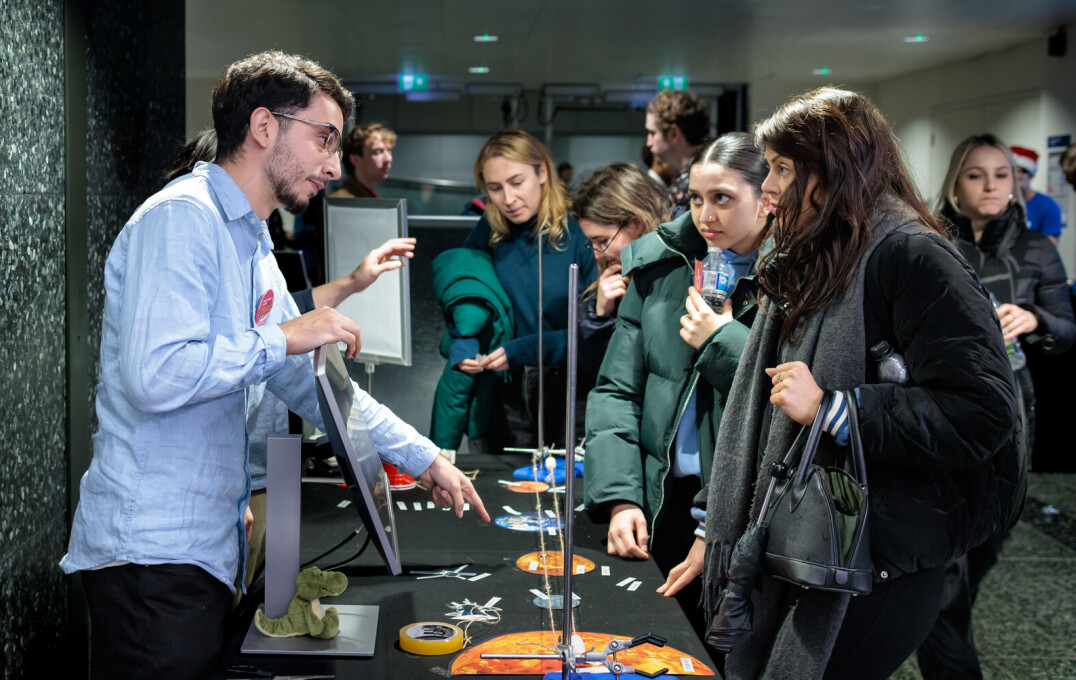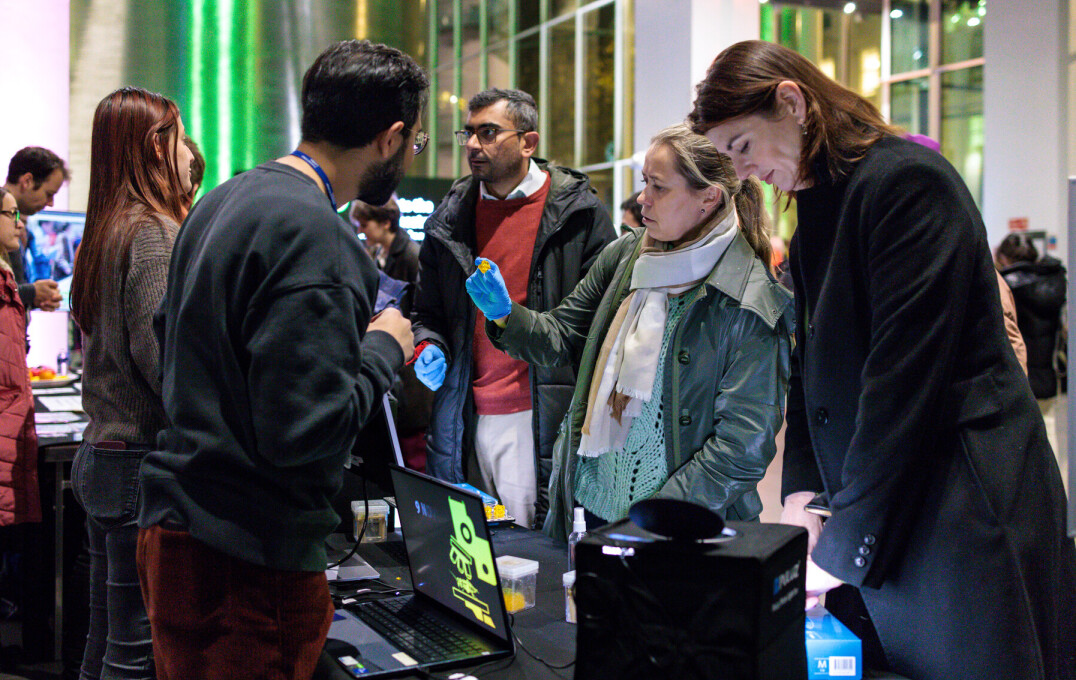Imperial Lates comes to a close with absorbing evening of AI
by Nisha Emich
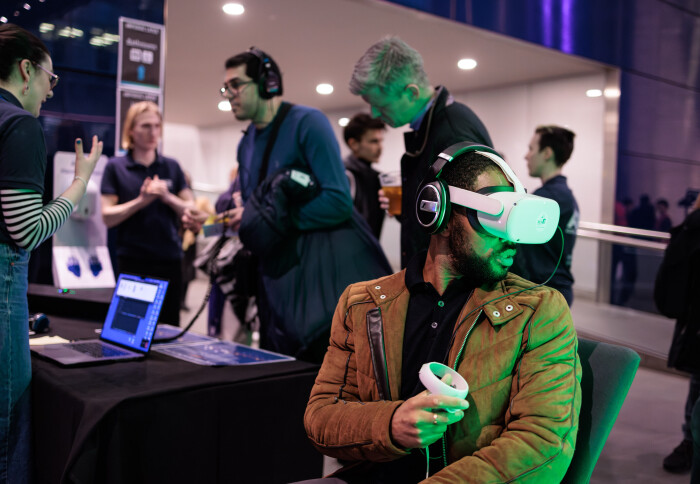
Incredible Imperial science shared through innovative and creative activities during 2023/24 Imperial Lates season
The latest season of Imperial College London’s popular after-hours events has ended on a high, with a packed evening on Thursday 14 March that brought the public together with Artificial Intelligence experts to separate fact from fiction around this revolutionary technology.
Around a thousand visitors delved into the realities of AI while learning more about cutting-edge research taking place across Imperial through talks, live demos, and creative workshops (including making AI-generated superheroes and trying face paint designs to fool facial recognition software).
A highlight of the evening was ‘Swarm dance: The intelligence silent disco’, created by Imperial experts in collaboration with artist Geraldine Cox. Following insight from Professor Julie McCann (Faculty of Engineering, Department of Computing), public participants moved as one under the guidance of three dance artists, exploring the concept of emergence in AI and how scientists are using swarm intelligence to build communities of robots that can help map, monitor, build, repair, and clean parts of our world.
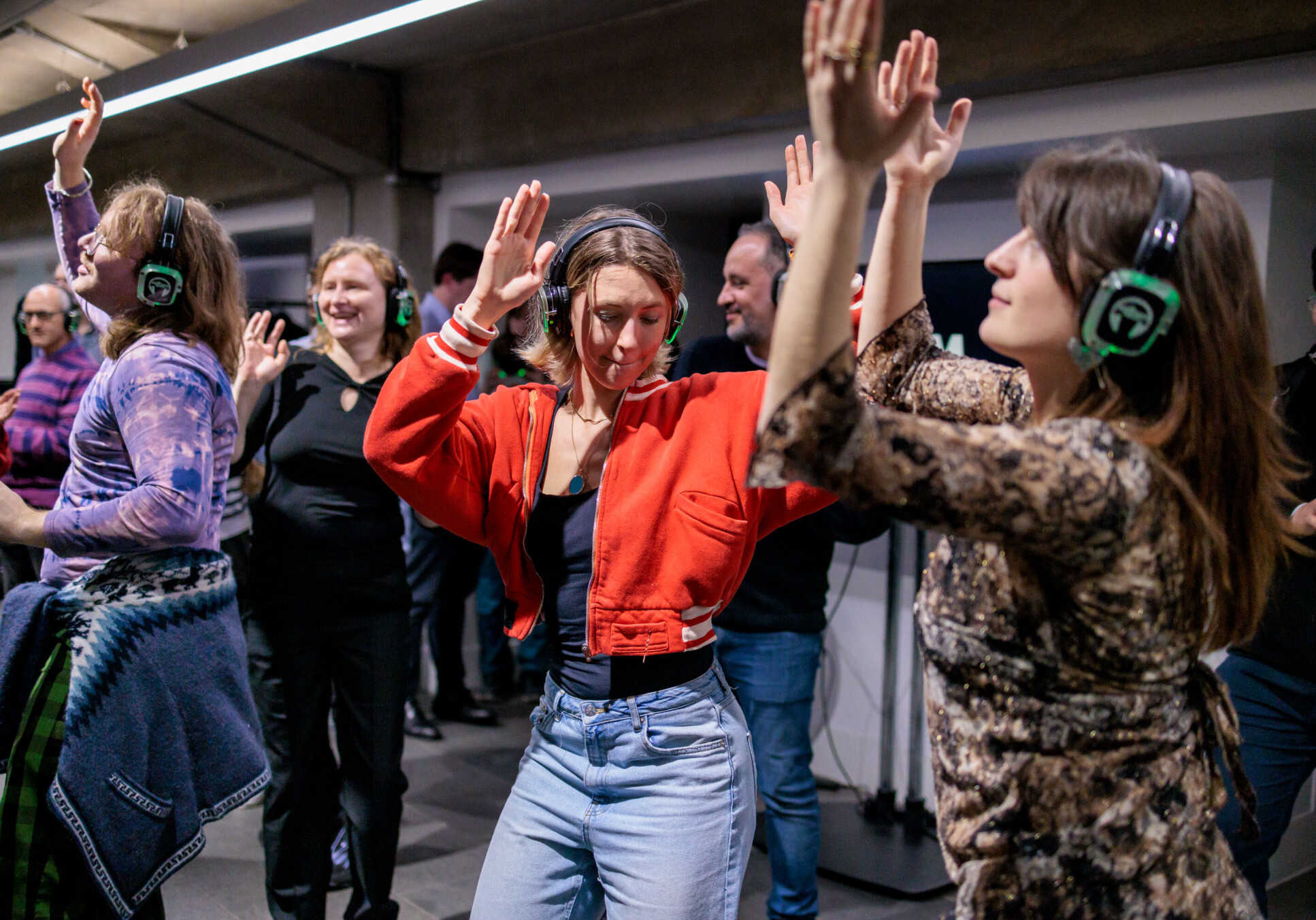
“We’re hugely grateful for all the hard work our Imperial community put into creating these four fantastic evenings of discovery!” James Romero Public Engagement Programme Manager
“It’s been an amazing season for Imperial Lates – with around 50 research teams and several hundred staff and students giving talks, hosting tours, showcasing their work through exhibits or collaborating with artists on creative workshops," said James Romero, Public Engagement Programme Manager.
"Imperial Lates offer a unique way for the public to engage with scientific research in a fun, social setting and we know how much people enjoy them. As a result, we’re hugely grateful for all the hard work our Imperial community put into creating these four fantastic evenings of discovery!”
Not only do engagement events increase visibility of Imperial’s research with the wider public, but they offer researchers the opportunity to connect with diverse audiences – learning what questions and concerns they have about the work we do, strengthening its relevance and application to wider society.
Rules of attraction
Last month, Imperial Lates took a romantic turn as the mysteries of attraction, reproductive health and sexual selection were explored on 8 February.
The evening included insight into brand new findings from the Centre for Psychedelic Research, which showed how magic mushrooms, LSD and other psychoactive compounds may help to improve sexual function, as well as a talk from Dyson School of Design Engineering’s Diana Canghizer and Director of the Vagina Museum, Florence Schechter.
 The pair had the audience in stitches as they discussed the importance of eradicating stigma around bodies in an empowering and accessible way.' They shared personal stories like Canghizer’s experience of misdiagnosis after going through hormonal imbalance, which led her to develop Vera AI – a gynaecological and hormonal health platform that aims to tackle misinformation surrounding menstrual health.
The pair had the audience in stitches as they discussed the importance of eradicating stigma around bodies in an empowering and accessible way.' They shared personal stories like Canghizer’s experience of misdiagnosis after going through hormonal imbalance, which led her to develop Vera AI – a gynaecological and hormonal health platform that aims to tackle misinformation surrounding menstrual health.
Megan Young, a research postgraduate in the Department of Metabolism, Digestion and Reproduction commented how Imperial Lates drives teams to find “innovative ways of telling people about research in order to spread the word.” Events like these “encourage people to get involved in research,” added Dr. Anastasia Newman, an academic foundation programme doctor in the same department, “research is cool, it’s interesting!”
 Young and Newman were part of a team that collaborated with artist Isabella Mitchell to develop a creative workshop where visitors could create Valentine’s Day cards inspired by kisspeptin – a hormone that could be used to treat women and men with hypoactive sexual desire disorder, a condition characterised by low sexual desire that is distressing to the individual – as well as providing Hershey’s Kisses to encourage conversations about where this love-boosting hormone comes from (if you’re interested finding out more about getting involved in kisspeptin research, please email imperial.kisspeptin@nhs.net).
Young and Newman were part of a team that collaborated with artist Isabella Mitchell to develop a creative workshop where visitors could create Valentine’s Day cards inspired by kisspeptin – a hormone that could be used to treat women and men with hypoactive sexual desire disorder, a condition characterised by low sexual desire that is distressing to the individual – as well as providing Hershey’s Kisses to encourage conversations about where this love-boosting hormone comes from (if you’re interested finding out more about getting involved in kisspeptin research, please email imperial.kisspeptin@nhs.net).
From tasty treats to cosmic curiosities
The season kicked off in November last year, with a ‘Future Food’ themed event where the public discovered the science behind their favourite foods, learnt whether they were supertasters, and created their own food-waste artwork.
 The night also featured an extremely popular demonstration on fluid dynamics (which may have included a chocolate fountain) as well as a sauerkraut workshop run by chef and fermentarian Clare Heal with Maria Valdivia-Garcia from the Department of Metabolism, Digestion and Reproduction teaching practical tips to improve gut health.
The night also featured an extremely popular demonstration on fluid dynamics (which may have included a chocolate fountain) as well as a sauerkraut workshop run by chef and fermentarian Clare Heal with Maria Valdivia-Garcia from the Department of Metabolism, Digestion and Reproduction teaching practical tips to improve gut health.
Just before the college closed for the holidays, we left the Earth behind for a space-themed Lates that included driving model Martian rovers, decorating lunar Christmas-tree ornaments, and sending festive songs across our solar system.
Visitors explored how we might live and work on the Moon with Britain’s first astronaut Helen Sharman, stepped onto the surface of Mars inside Imperial’s Data Observatory with Professor Sanjeev Gupta (the Department of Earth Science & Engineering), before settling down for some space science inspired comedy from award-winning improv group Do Not Adjust Your Stage.
What’s coming up next?
Imperial Lates will be back for another season in autumn this year, as the Public Engagement team shift focus to Imperial’s flagship public event the Great Exhibition Road Festival, which will be returning to South Kensington on 15-16 June! Run in partnership with iconic institutions on and around Exhibition Road – including the National History Museum, Science Museum, V&A, Royal College of Music and many more – this year’s Festival will celebrate how science and the arts help people, communities, and nature flourish.
Each year the festival hosts hundreds of free workshops, talks and performances for all ages, with staff and students across Imperial College London making a huge contribution to its success! Curious about ways you can be involved? Check out the volunteering opportunities open to our Imperial community now.
Article text (excluding photos or graphics) © Imperial College London.
Photos and graphics subject to third party copyright used with permission or © Imperial College London.
Reporter
Nisha Emich
Office of the Provost
